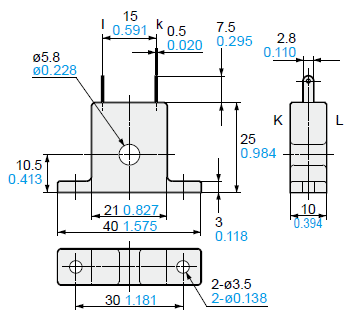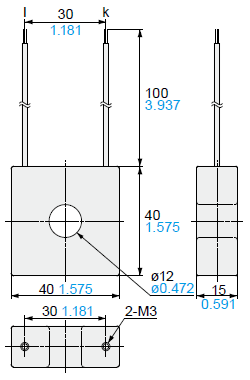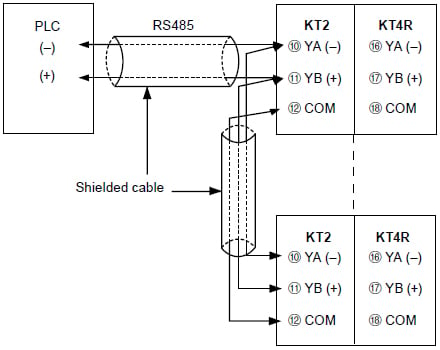KT4R Temperature Controller (Discontinued Products)
Download
-
Discontinued Products
-
Number System
-
Rating/ Performance
-
Dimensions
-
Wiring/ Connection
-
Cautions For Use
Ⅾiscontinued
Last time buy (JST)
September 29, 2023
We are sorry, the products have been discontinued. Please refer to the details of the discontinued products and the recommended substitutes list below.
Discontinued Products

Number System

Note: Using EV2 assigned settings, use for heating and cooling control is possible.
Rating/ Performance
Performance outline
| Item | Specifications | ||||
|---|---|---|---|---|---|
| CE marking directive compliance | Low Voltage Directive, EMC Directive, RoHS Directive | ||||
| Size | 48×48mm 1.890 × 1.890 in | ||||
| Rating | Rating power supply (Must be specified) | 100 - 240V AC | |||
| 24V AC / DC | |||||
| Rating frequency | 50 / 60Hz | ||||
| Rating power consumption | 8 VA approx. | ||||
| Rating scale | Input type | Input range | |||
| Thermocouple | K | -200 to 1,370℃ (-328 to 2,489℉) | |||
| -200.0 to 400.0℃ (-328.0 to 752.0℉) | |||||
| J | -200 to 1,000℃ (-328 to 1,832℉) | ||||
| R | 0 to 1,760℃ (0 to 3,200℉) | ||||
| S | 0 to 1,760℃ (0 to 3,200℉) | ||||
| B | 0 to 1,820℃ (32 to 3,308℉) | ||||
| E | -200 to 800℃ (-328 to 1,472℉) | ||||
| T | -200.0 to 400.0℃ (-328.0 to 752.0℉) | ||||
| N | -200 to 1,300℃ (-328 to 2,372℉) | ||||
| PL-II | 0 to 1,390℃ (32 to 2,534℉) | ||||
| C (W / Re5−26) | 0 to 2,315℃ (32 to 4,199℉) | ||||
| RTD | Pt100 | -200 to 850℃ (-328 to 1,562℉) | |||
| -200.0 to 850.0℃ (-328.0 to 1,562.0℉) | |||||
| JPt100 | -200 to 500℃ (-328 to 932℉) | ||||
| -200 to 500.0℃ (-328.0 to 932.0℉) | |||||
| DC | Current | 4 to 20 mA DC | -2,000 to 10,000 | ||
| 0 to 20 mA DC | |||||
| Voltage | 0 to 1 V DC | ||||
| 0 to 10 V DC | |||||
| 1 to 5 V DC | |||||
| 0 to 5 V DC | |||||
| ・Scaling and change to the decimal point position is possible for DC current input and DC voltage input. | |||||
| Sensor input | Thermocouple | K, J, R, S, B, E, T, N, PL-II, C (W / Re5-26) External resistor: Max. 100 Ω (Max. 40 Ω external resistor for B input) | |||
| RTD | Pt100, JPt100 3-conductor system (Allowable input conductor resistance for each conductor: 10 Ω or less) | ||||
| DC current | 0 to 20 mA DC | Input impedance: 50Ω (Connect 50Ω shunt resistor between input terminals.) Allowable input current: 50 mA or less (When 50Ω shunt resistor is used) | |||
| 4 to 20 mA DC | |||||
| DC voltage | 0 to 1 V DC | Input impedance: 1 MΩ or more, Allowable input voltage: 5 V or less, Allowable signal source resistance: 2 kΩ or less | |||
| 0 to 5 V DC | · 0 to 5 V DC, 1 to 5 V DC, 0 to 10 V DC Input impedance: 100 kΩ or more, 1 to 5 V DC Allowable input voltage: 15 V or less, Allowable signal source resistance: 100 Ω or less | ||||
| 1 to 5 V DC | |||||
| 0 to 10 V DC | |||||
| Control output | Relay contact | (Must be specified) | 1a | ||
| 3 A 250 V AC (at resistive load), 1 A 250 V AC (at inductive load cos ø = 0.4), Electrical life: 100,000 times | |||||
| Non-contact voltage (voltage output for SSR drive) | 12+20 V DC, Max. load current: 40 mA (with short circuit protection circuit) | ||||
| DC current | 4 to 20 mA DC, Load resistance: Max. 550 Ω | ||||
| Alarm output 1 (EV1) | Relay contact 1a 3 A 250 V AC (Resistive load) 1a 1 A 250 V AC (cosø=0.4) Electrical life: 100,000 times | ||||
| Alarm output 2 (EV2) | Same as Alarm output 1 | ||||
| Control method | PID action (with auto-tuning function), PI action, PD action (with manual reset function), P action (with manual reset function), ON / OFF action | ||||
| Target temperature setting | - | ||||
| Program control function | 1 pattern, 9-step setting is possible (However, make function selection setting of either control with fixed set point or program control.) | ||||
| Indication accuracy | Thermocouple | Within ± (0.2 % + 1 digit) of each input span or within ±2 ℃ (4 ℉) whichever is greater However, R or S input; within ±6 ℃ (12 ℉) in the range of 0 to 200 ℃ (32 to 392 ℉) B input, range of 0 to 300 ℃ (32 to 572 ℉): accuracy is not guaranteed. K, J, E, T, and N input, less than 0 ℃ (32 ℉): within ± (0.4 % ±1 digit) of input span | |||
| RTD | Within ± (0.1 % + 1 digit) of each input span or ±1 ℃ (2 ℉) whichever is greater | ||||
| DC current and DC voltage | Within ± (0.2 % + 1 digit) of each input span | ||||
| Sampling period | 125ms | ||||
| Hysteresis (ON / OFF) | Thermocouple and RTD: 0.1 to 1,000.0 ℃ (℉) DC current and DC voltage: 1 to 10,000 (The decimal point place follows the selection) | ||||
| Proportional band | Input without decimal point: 0 to Input span Input with decimal point: 0.0 to Input span DC current and DC voltage: 0.0 to 1,000.0 % | ||||
| Integral time | 0 to 3,600 seconds | ||||
| Derivative time | 0 to 1,800 seconds | ||||
| Proportional cycle | 1 to 120 seconds | ||||
| Allowable voltage fluctuation | When 100 to 240 V AC: 85 to 264 V AC, When 24 V AC / DC: 20 to 28 V AC / DC | ||||
| Insulated resistance | 500 V DC, Min. 10 MΩ | ||||
| Breakdown voltage | Between input terminal and power terminal Between output terminal and power terminal 1.5 kV AC for 1 min. | ||||
| Malfunction vibration | 10 to 55 Hz (1 cycle/min.), single amplitude: 0.35 mm 0.014 in (10 min. on 3 axes) | ||||
| Breakdown vibration | 10 to 55 Hz (1 cycle/min.), single amplitude: 0.75 mm 0.030 in (1 hour on 3 axes) | ||||
| Malfunction shock | X, Y and Z each direction for 5 times 98 m/s2 | ||||
| Breakdown shock | X, Y and Z each direction for 5 times 294 m/s2 | ||||
| Ambient temperature | −10 to 55 ℃ 14 to 131 ℉ | ||||
| Ambient humidity | 35 to 85 % RH (No condensation) | ||||
| Mass | 110 g approx. | ||||
| Waterproof | IP66 (applicable only to the front panel subject to rubber gasket employed) | ||||
| Display character height | PV: 12.4 mm 0.488 in SV: 8.8 mm 0.346 in | ||||
| Option functions | Heating / Cooling control | Relay contact | Using EV2 assigned setting, use for heating and cooling control is possible. | ||
| Non-contact voltage | - | ||||
| Heater burnout alarm output | - | ||||
| Communication function | Please refer below to "COMMUNICATION PERFORMANCE OUTLINE". | ||||
| Accessories | Installation frame / Mounting bracket | Included with controller | |||
| Terminal cover | Sold separately | ||||
| Rubber gasket | Included with controller | ||||
COMMUNICATION PERFORMANCE OUTLINE
| Item | Specifications |
|---|---|
| Communication method | Half-duplex |
| Communication speed | Select 9600, 19200 or 38400 bps using key operation. |
| Synchronous method | Asynchronous |
| Protocol | Modbus (RTU, ASCII), MEWTOCOL (Slave) |
| Coding | Binary / ASCII |
| Error correcting | Command resending |
| Error detection | Parity check and check sum |
| Data structure | Start bit: 1 Data bit: 7, 8 (For Modbus RTU: 8 only) Parity: Even / Odd / None Stop bit: 1 or 2 |
| Interface | EIA RS-485 compliant |
| Number of nodes | 31 |
| Maximum communication distance | 1,000 m 3,280.840 ft (cable resistance must be within 50 Ω) |
Dimensions
- Unit: mm in

Note:1)Dimensions when terminal cover is fitted.:2)The communications terminal is the screw terminal on the back of the controller.
Panel cut-out dimensions

Tolerance: ±1±0.039
CT1
Current transformer (CT) (for 5, 10, and 20A)

CT2
Current transformer (CT) (for 50 A)

Note:
Current transformer CT1 or CT2 is included (only with KT7 and KT4H)
when heater burnout alarm function is added.
Wiring/ Connection
EXTERNAL CONNECTION DIAGRAM

PWR : Power supply voltage 100-240 V AC or 24 V AC / DC (Ensure correct polarity when using DC in AC / DC 24 V.)
EV1 : Alarm output 1
EV2 : Alarm output 2 (optional) O1 : Control output 1
TC : Thermocouple input
RTD : Resistance temperature detector input
DC : DC voltage input or DC current input
RS-485 : Serial communication RS-485
COMMUNICATION FUNCTION CONNECTION DIAGRAM (PLC Connection Diagram)

Note:Terminating resistors (Terminators)The KT series has a built-in pull-up resistor or pull-down resistor, which serves as the terminating resistor.For this reason, do not connect the terminating resistor on the communication line.
Cautions For Use
Mounting
Please install to a rigid, irregularity-free flat surface in order to satisfy the IP66 specification for dust and splash proofing.
Panel thickness for installation: 1 to 5 mm 0.039 to 0.197 in.
(1)Insert the unit from the front of the control panel.
(2)Insert the installation frame until that the edges make contact with the panel and tighten the screw.
Fix by rotating screws one full turn after contact of screw tip and panel.
Apply tightening torque of 0.15 N•m.

Part description

Note: Color selection is the same for each size.
(1)PV display : Indicates the process value (PV). (2)SV display : Indicates the setting value (SV) (3)Increase key : Increases the numeric value (4)Decrease key : Decreases the numeric value (5)Mode key : Selects the setting mode or registers the setting value. (6)OUT / OFF key : The control output ON / OFF, auto / manual control function or program control can be switched. (7)Action indicators O1 : Lights up when control output 1 is ON.Lights up when heating control output (option) is ON.
For DC power output type, it flashes corresponding to the manipulated variable in a 125 ms cycle O2 : Lights up when cooling control output (option) is ON. EV1 : Lights when Alarm 1 output is ON. EV2 : Lights when Alarm 2 output (option) is ON. AT : Flashes during auto-tuning or auto-reset T/R : Lights during serial communication (option) TX output.
Notes on site selection
This controller is intended to be used in the following environment (IEC 61010-1)
Mount the controller in a place with:
- Overvoltage category II and Pollution degree 2
- A minimum of dust, and an absence of corrosive gases
- No flammable, explosive gases
- Few mechanical vibrations or shocks
- No exposure to direct sunlight, an ambient temperature of -10 to 55 ℃ 14 to 131 ℉ that does not change rapidly. (When installing inside a panel, make particular allowance for heat dissipation. Avoid installation in situations such as above equipment that generates heat.)
- Locations in which temperature rapidly changes may cause condensation.
- Locations or atmospheres in which benzine, thinners, alcohol, or other organic solvents are present, or in which ammonia, sodium hydroxide, or other strong alkaline substances may adhere.
- Locations susceptible to direct impact or the transmission of vibrations, or where splashing with water is possible.
- In the proximity of equipment in which large switching surges occur or near high-voltage cables, high-voltage equipment, power lines, power equipment, ham radio transmitters, or equipment containing these or similar devices.
- An ambient non-condensing humidity of 35 to 85 % RH
- No large capacity electromagnetic switches or cables through which large current is flowing
- No water, oil or chemicals or where the vapors of these substances can come into direct contact with the controller
Notes on wiring
| Wire-pressed terminal | Company name | Type name | Fastening torque |
|---|---|---|---|
| Fork type | NICHIFU Co., Ltd. | 1.25Y-3 | 0.6 N•m Max. 1.0 N•m. |
| J.S.T. Mfg. Co., Ltd. | VD1.25-B3A | ||
| Round type | NICHIFU Co., Ltd. | 1.25-3 | |
| J.S.T. Mfg. Co., Ltd. | V1.25-3 |
- The terminal block of KT4R / KT8R / KT9R / KT4H / KT4B series are designed to be wired from the left side (The terminal of KT2 series are designed to be wired from the upper and lower direction). The lead wire must be inserted from the left side of the terminal, and fastened by the terminal screw. Use a wirepressed terminal with insulation sleeve that fits to the M3 screw.

- Terminal screw fastening torque is 0.6 N·m to 1.0 N·m (for KT4R / KT8R / KT9R / KT4H / KT4B series). For KT7 series by M3 screw is less than 0.5 N·m and by M2 screw is less than 0.25 N·m respectively.
- Use a thermocouple and compensating lead wire according to the sensor input specification of the controller.
- Use a 3-wire system of RTD according to the sensor input specification of the controller.
- This controller has no built-in power switch, circuit breaker and fuse. Therefore, it is necessary to install them in the circuit near the external controller. (Recommended fuse: Time-lag fuse, rating voltage 250 V AC, rating current 2 A)
- In the case of 24 V AC / DC power supply, do not confuse the polarity when it is DC.
- With the relay contact output type, use the relay externally according to the capacity of the load to protect the built-in relay contact.
- When wiring, keep input wire (Thermocouple, RTD, etc.) away from power source wire and load wire.
- Turn the power supply to the instrument off before wiring or checking. Working or touching the terminal with the power switched on may result in electric shock which could cause severe injury or death.
- Do not drop wire chips into the holes of vent when wiring.
- To prevent the controller from harmful effects of unexpected high level noise, it is recommended that a surge absorber be installed between the electromagnetic switch coils.
Notes on mounting
- Do not use excessive force while screwing in the mounting frame and mounting bracket of KT4R / KT8R / KT9R / KT4H / KT4B series.
For KT8R / KT9R series, recommended torque is approximately 0.1 N·m.
For KT4H / KT4B series, recommended torque is approximately 0.05 to 0.06 N·m.
For KT4R series, recommended torque is approximately 0.15 N·m. - When mounting the KT7 series to the DIN rail, mount it in a lateral direction. Make sure a click is audible when fixed into place.